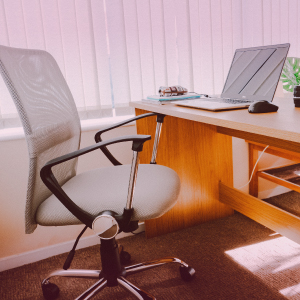
In the last article, Umbrella Exchange looked at the practical considerations of working from home, including you computer, software and internet requirements. In part two, we look at additional considerations, such as creating a separate workspace, putting a workday routine in place and the expenses you might consider claiming.
Office space

Contractors working from home need to ensure that they have a particular place that you consider your work-space. It could be a spare room that you use as an office, or a desk in the corner of a room, but there should be some separation between your work and leisure/living space. Working on the kitchen table isn’t ideal, as your work could get disturbed or cleared away.
Having a designated work space will ensure confidentiality and allow you to keep this area organised and undisturbed. It will also allow you to create an optimum flow to maximise your productivity. Another advantage of a separate workspace is that it will allow you to make a mental distinction between work and leisure.
Structure and routine
As well as structuring your workspace for maximum productivity, you’ll get more out of your working day if you put a routine in place to structure your time. Although contractors can find that their work hours might change according to the assignment, most contractors who work from home will have a certain amount of freedom to work hours that suit them.
Make sure you use your time effectively by sectioning off your most productive time for undisturbed working. While many people find that working from home helps them to achieve a better work-life balance, it can be difficult to switch off when you don’t have a workplace to leave. Creating a workday for yourself can help you to focus and set boundaries.
Just because you work from home this doesn’t mean you should confine yourself to your room. Networking sites like LinkedIn can help you reach out to others in the industry while you’re working on a project. If you need to communicate with someone, make sure you aren’t forgotten. You can use Facetime or Skype to check in with people face to face, while web apps like basecamp and slack will allow you to collaborate with other people working on a project.
Sometimes, contractors might miss the energy of a workplace to help generate ideas. Sitting in silence or looking at the wall can be zap your inspiration. Many public spaces have Wi-Fi and contractors can always go to a café, coffee shop or co-workspace to recreate the buzz of an office.
Claiming expenses

Using your home as an office can be a great way to lower the overall cost of doing business. Contractors working from home might be able to claim expenses for their home office. However, be ready for some push back from the tax authorities. If you genuinely work from your home office and decide to claim for this expenses then some factors need considering.
- When using your home as an office you must keep a dedicated room/workspace to use exclusively for this purpose.
- Your home office should be furnished and adequately equipped as a genuine business facility.
- You should arrange business insurance for your home contents.
- If you are intending to claim expenses for your office at home it is essential that you actually do some work there.
- The amount you can claim should be based on an appropriate proportion of the utility costs.
With the right facilities and structure in place, home-working can maximise your productivity while keeping your contracting costs low. Working from home is also one of the many ways that contracting can contribute to a better work/life balance. However, if you’re used to working in an office, some people can find contracting stressful and isolating. Read our article to find out if you’re cut out for a career in contracting.
To talk to a member of our team about you contracting options, call 0203 393 3881